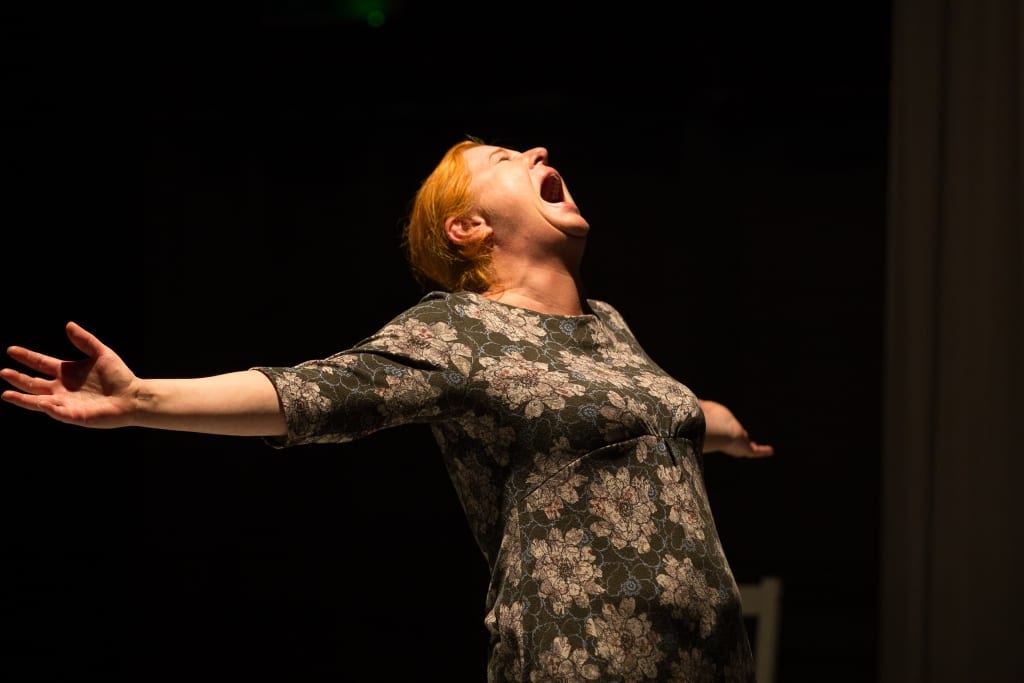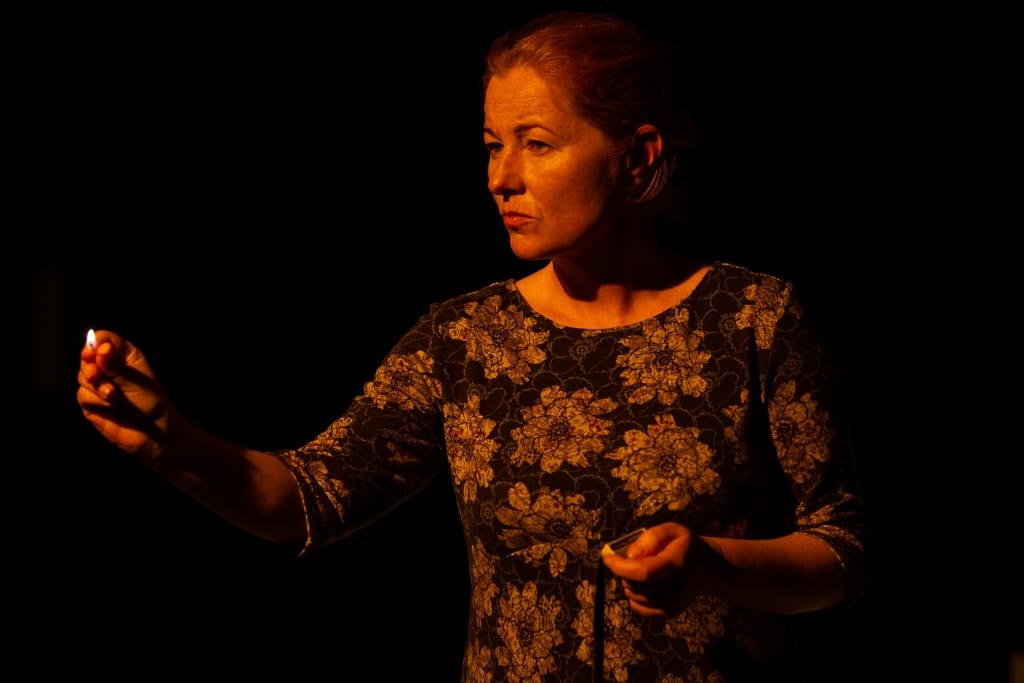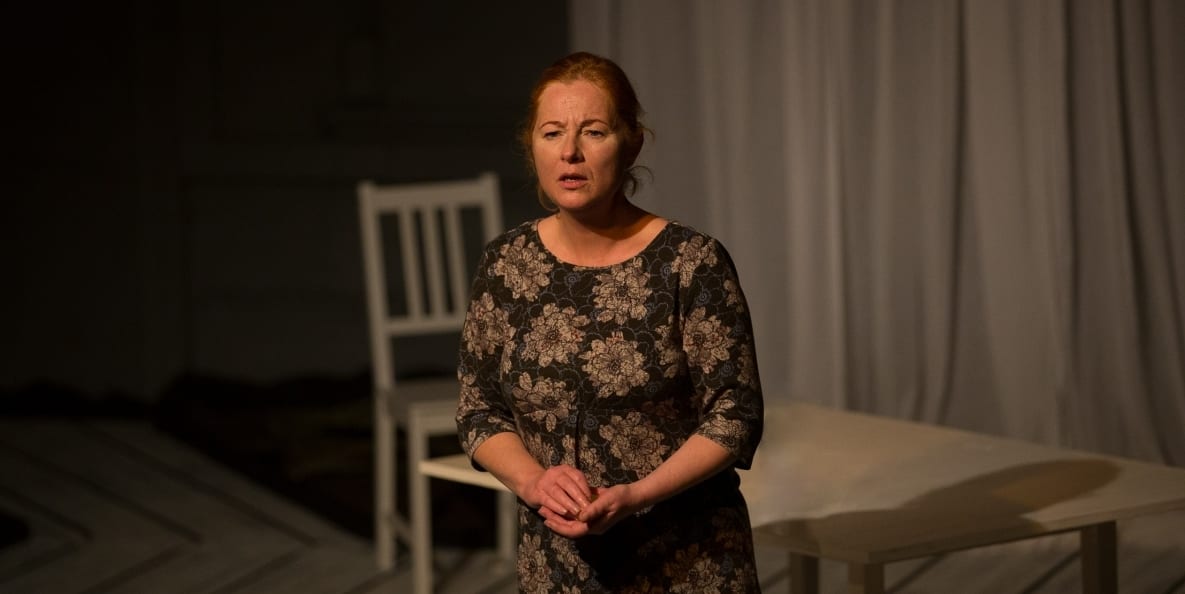Frank McGuinness has built up a formidable reputation over the past thirty years as a poet, adaptor of plays in translation, writer of screenplays and above all as an original dramatist. All of his plays, which cover a myriad of subjects, share a fierce and rigorous moral intensity which is tempered by and contrasted with an unexpected, uninhibited and forgiving humour. It is a paradoxical combination that is both distinctively individual and recognisably Irish.
There are still many of his plays which have had few if any outings in this country. ‘The Match Box’, dating from 2012, has only been seen before in Liverpool and deserves to be better known. It is a two-hour monologue that places huge demands on the single female actor, but which covers a vast range of emotions along the way. The character is best understood alongside his recent series of adaptations from Greek drama – Elektra, Hecuba and Phaedra – all Greek heroines uncompromising in the face of grim dilemmas of retribution. As McGuinness has said elsewhere, ‘There’s a ruthlessness there in the Greeks – an absolute pitilessness. And sometimes you need to stand before that kind of judgment, where there’s no mercy.’ (Guardian 2008) It also feels close in tone to Lorca’s stories of feuding and vengeful families, within which McGuinness has also worked.

We meet Sal (Angela Marray) lighting matches and enjoying the smell of sulphur in what appears to be a small back garden with basic furniture. She is on edge but also lonely, washed up on a remote Irish island off Kerry with no company and little to do. Gradually her story emerges, and it is one of fairly unremitting trauma. Growing up in England with Irish parents she becomes a single mother and then loses the daughter to whom she is devoted to a random bullet during a youth-gang shoot-out. Against advice and to the horror of her parents she offers a press conference forgiveness to her daughter’s killers and then grows more and more disillusioned and distanced from society and family as little is done to catch those responsible. The family in question are then hit by a fatal fire and strict, literal narrative flow begins to fragment. Is this symbolic justice? Rough justice? Planned revenge? We are left to construct the ultimate meaning and emotional values of the story for ourselves, as Sal herself seems to fragment in front of us.

What stands out above all her is the detailed portrait of all the shades of unimaginable grief displayed here with great skill by Marray. On press night she was not entirely word perfect – understandable in such a huge endeavour – but structurally and emotionally this is a fully rounded performance of great power and stature that deserves to be seen by full houses in this intimate space. Director and actor successfully blend static picture painting with the pace of a driven narrative line as well. Movement director Rachel Isaac ensures that there is plenty to watch as well as listen to, and the sound scheme by Jon McLeod punctuates the scenes with useful underscore without intruding. Amy Daniels, in charge of the lighting, gives us a subtle sense of time and place. But it is Marray who lingers in the memory: she not only gives us a vivid sense of the kaleidoscope of emotions and reactions that Sal experiences, but she also characterises those around her with great individuality and precision of accent. We get to know Mary the daughter and her pesky pet rabbit, Terence. We feel the contrasted reactions of Sal’s Irish parents – her devout but alarmingly practical mother, and her more sentimental father, who all the same cannot come to terms with his daughter’s outreach to his granddaughter’s killers. The actor makes us feel we have seen a play with several and not simply one performer.
This is undoubtedly an unsettling evening, but there are many points of humour, whether of verbal wit or of situation, that serves to lighten the darkness. As so often with this author’s work, we are invited to confront impossibly challenging and painful situations; but the character’s reaction and responses leave us strangely encouraged and reassured in the face of wry defiance and resilient unwillingness to abandon, not exactly hope, but at least the possibility of future action. And all surrounded and enhanced by a bristling and unillusioned humour.

